Αρχή
Principles, Variational principle

Επιστήμες
Επιστημονικός Νόμος
Επιστημονικοί Νόμοι
Μαθηματικό Θεώρημα
Νόμοι Μαθηματικών
Φυσικός Νόμος
Νόμοι Φυσικής
Νόμοι Χημείας
Νόμοι Γεωλογίας
Νόμοι Βιολογίας
Νόμοι Οικονομίας
- Είναι ένας Επιστημονικός Νόμος
Ετυμολογία[]
Η ονομασία "αρχή" σχετίζεται ετυμολογικά με το όνομα του επιστήμονα "[[ ]]".
Διατύπωση[]
Είναι μία Εξίσωση.
A variational principle is a scientific principle used within the calculus of variations, which develops general methods for finding functions which minimize or maximize the value of quantities that depend upon those functions. For example, to answer this question: "What is the shape of a chain suspended at both ends?" we can use the variational principle that the shape must minimize the gravitational potential energy.
According to Cornelius Lanczos, any physical law which can be expressed as a variational principle describes an expression which is self-adjoint. These expressions are also called Hermitian. Such an expression describes an invariant under a Hermitian transformation.
Felix Klein's Erlangen program attempted to identify such invariants under a group of transformations. In what is referred to in physics as Noether's theorem, the Poincaré group of transformations (what is now called a gauge group) for general relativity defines symmetries under a group of transformations which depend on a variational principle, or action principle.
Πίνακας Μεταβολικών Αρχών[]
- Variational principle of Ivar Ekeland
- Fermat's principle in geometrical optics.
- The principle of least action in mechanics, electromagnetic theory, and quantum mechanics.
- Maupertuis principle in classical mechanics.
- The Einstein equation also involves a variational principle, the Einstein-Hilbert action.
- Gauss' principle of least constraint.
- Hertz's principle of least curvature
- Palatini variation
- The variational method in quantum mechanics
- The Finite element method
Υποσημειώσεις[]
Εσωτερική Αρθρογραφία[]
- Επιστημονική Αρχή
- Επιστημονικός Νόμος
- Επιστημονικοί Νόμοι
- Εξίσωση
- Εξισώσεις
- Φυσικός Νόμος
- Φυσικοί Νόμοι
- Νόμοι Διατήρησης
- Μεταβολική Αρχή Luke
- Μεταβολική Αρχή Rayleigh-Ritz
Βιβλιογραφία[]
- Ekeland, Ivar (1979). "Nonconvex minimization problems". Bulletin of the American Mathematical Society. New Series 1 (3): 443–474. doi:.
- S T Epstein 1974 "The Variation Method in Quantum Chemistry". (New York: Academic)
- R.P. Feynman, "The Principle of Least Action", an almost verbatim lecture transcript in Volume 2, Chapter 19 of The Feynman Lectures on Physics, Addison-Wesley, 1965. An introduction in Feynman's inimitable style.
- C Lanczos, The Variational Principles of Mechanics (Dover Publications)
- R K Nesbet 2003 "Variational Principles and Methods In Theoretical Physics and Chemistry". (New York: Cambridge U.P.)
- S K Adhikari 1998 "Variational Principles for the Numerical Solution of Scattering Problems". (New York: Wiley)
- C G Gray, G Karl G and V A Novikov 1996 Ann. Phys. 251 1.
- C.G. Gray, G. Karl, and V. A. Novikov, "Progress in Classical and Quantum Variational Principles". 11 December 2003. physics/0312071 Classical Physics.
- Griffiths, David J. (2004). Introduction to Quantum Mechanics (2nd ed.). Prentice Hall. ISBN 0-13-805326-X.
- Stephen Wolfram, A New Kind of Science p. 1052
- John Venables, "The Variational Principle and some applications". Dept of Physics and Astronomy, Arizona State University, Tempe, Arizona (Graduate Course: Quantum Physics)
- Andrew James Williamson, "The Variational Principle -- Quantum monte carlo calculations of electronic excitations". Robinson College, Cambridge, Theory of Condensed Matter Group, Cavendish Laboratory. September 1996. (dissertation of Doctor of Philosophy)
- Kiyohisa Tokunaga, "Variational Principle for Electromagnetic Field".Πρότυπο:Dead link Total Integral for Electromagnetic Canonical Action, Part Two, Relativistic Canonical Theory of Electromagnetics, Chapter VI
- Komkov, Vadim (1986) Variational principles of continuum mechanics with engineering applications. Vol. 1. Critical points theory. Mathematics and its Applications, 24. D. Reidel Publishing Co., Dordrecht.
- Cassel, Kevin W.: Variational Methods with Applications in Science and Engineering, Cambridge University Press, 2013.
Ιστογραφία[]
|
Αν και θα βρείτε εξακριβωμένες πληροφορίες "Οι πληροφορίες αυτές μπορεί πρόσφατα Πρέπει να λάβετε υπ' όψη ότι Επίσης, |
- Μην κάνετε χρήση του περιεχομένου της παρούσας εγκυκλοπαίδειας
αν διαφωνείτε με όσα αναγράφονται σε αυτήν
- Όχι, στις διαφημίσεις που περιέχουν απαράδεκτο περιεχόμενο (άσεμνες εικόνες, ροζ αγγελίες κλπ.)
